Augmented reality healthcare advances are growing at an exponential rate. The metaverse-related technologies, like augmented reality, can be adapted to almost any task or field. But medicine, in particular, is a perfect match for these exciting technologies. The metaverse can be quite a literal lifesaver. And you’re about to discover how augmented reality contributes to this vitally important subject.
Quick Menu:
- Building Augmented Reality Healthcare Through the Metaverse
- What Is Augmented Reality?
- What Is the Difference Between Virtual Reality, Mixed Reality, Augmented Reality, and Extended Reality?
- What Is the Healthcare Industry?
- 9 Ways to Benefit from Augmented Reality in Healthcare
- 3 Brands Using Augmented Reality in Healthcare
- Augmented Reality Healthcare Is One Part of a Larger Whole
Building Augmented Reality Healthcare Through the Metaverse
Examining its larger metaverse meaning is the first step in understanding augmented reality healthcare advances. The metaverse should be seen as a convergence between two worlds – the physical and the online. The two merge through new technologies and applications to create a new universe you can access whenever you desire. It’s always on, and your actions within it persist just as they would in the physical world.
You can fully immerse yourself in the metaverse through virtual reality gear like a VR headset. But you can access other elements with metaverse devices like phones, game consoles, hololens, or computers. You’ll also find that metaverse news moves rapidly since the technology is still “fully” in development and benefits from different visions. You find the full story of this rapidly-evolving realm in the article “Metaverse Guide; Understanding The Basics Will Open Up a New World”.
What Is Augmented Reality?
The next step to understanding augmented reality healthcare developments involves looking at augmented reality (AR). Just as the name suggests, augmented reality comes about by adding elements to your perception of the world. These augmentations are done in real-time so that it appears natural. Use an augmented reality device to look at the world, and you’ll see the standard sights around you. But you’ll also see a range of digital components laid out around the 3D physicality you’re used to. But augmented reality isn’t limited to just visual data.
Different AR systems might also provide audio or other sensory feedback and visual augmentation. These elements can either add or build upon the physical world or outright replace those elements. You can learn about AR’s creation and growth in the article “Augmented Reality; Learn About AR Tech, Use Cases, Devices, and More!”
What Is the Difference Between Virtual Reality, Mixed Reality, Augmented Reality, and Extended Reality?
Augmented reality healthcare systems, and general AR, enhance people’s view of the world. But you could also don a headset to fully envelop yourself in an artificial digital world through virtual reality (VR). Mixed reality (MR) has elements of both and merges the physical and digital through projects like HoloLens. VR is fully explained in the article “Virtual Reality; Discover VR, Its Components, Technology, and Players”. You’ll learn about MR in the article “Mixed Reality; Everything to Know About MR Technologies”. And you can find out about ER in the article “Extended Reality; How is XR Changing the Digital World?”.
What Is the Healthcare Industry?
The final piece of the augmented reality healthcare puzzle is healthcare itself. The industry covers almost anything related to treating patients, including direct care from doctors and nurses. But all sectors that provide the necessary tools and supplies used to treat patients are also part of the industry. This already broad tent can be expanded even further. Some people also define the healthcare industry to include everyone involved in regulation, training, education, and other tertiary roles. Some examples of healthcare workers include, though aren’t limited to, ambulance and patient transport, medical supply, and medical device manufacturing.
9 Ways to Benefit from Augmented Reality in Healthcare
Now that you have a solid grasp of augmented reality healthcare concepts, it’s time to look at some exciting developments within that sphere. It’s time to delve into the real meat of the subject – practical application. There’s a virtually unlimited number of applications for AR in healthcare. But you’re about to see the absolute best of the best among the various AR healthcare options currently on the market.
Augmented Surgeries
Tools are essential to any surgical procedure, and augmented reality healthcare is a powerful implement. It lets doctors access vast amounts of information during surgical procedures without using their hands. This can include real-time displays of patients’ vitals during surgery or even views of their anatomy. AR can overlay MRI or CT data onto the patient. And AR can even bring the operating doctors into contact with peers. This might be identifying abnormal surgical issues or consultations and assistance through remote connections. All of these possibilities and more converge into powerful surgical tools.
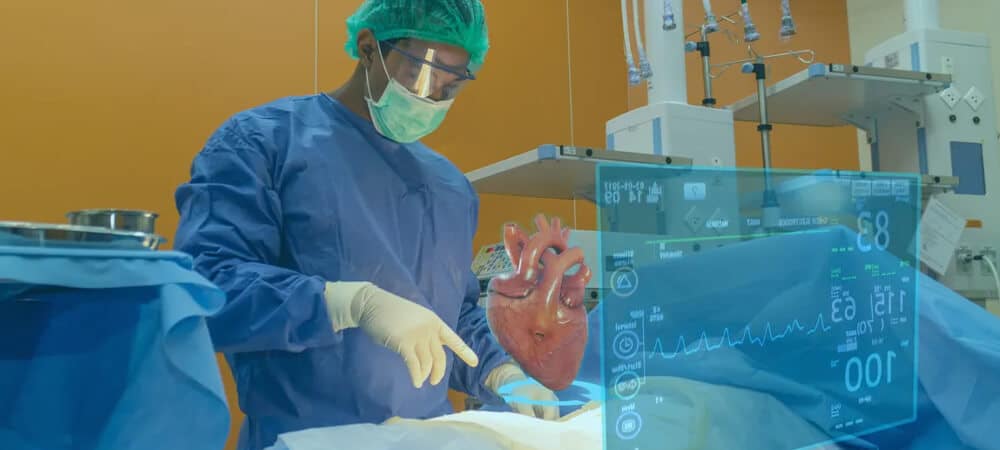
Image attribution: CIFS Health
Facilitating Symptom & Diagnosis Communication
Metaverse companies often emphasize socialization and communication. And augmented reality healthcare technologies often leverage their inherent ability to bridge the gaps between people. In this context, it’s an especially effective way of helping patients and medical staff communicate. Augmented reality can help patients overcome any lack of medical terminology and show doctors what’s wrong. Likewise, doctors can sidestep issues with complicated medical terminology and demonstrate what problems like cataracts might have on a patient’s life. In these examples and countless more, you can see just how much augmented reality improves people’s ability to convey complex ideas.
Medical Imaging
There are several reasons why surgery is such a complex field. But one of the most significant is the simple fact that surgeons need to work on areas of the human body that aren’t perceptible to the naked eye. Surgeons must work with minimal areas and elements hidden under a patient’s skin. But augmented reality healthcare options are making those areas far easier to deal with. AR can provide enhanced MRI and CT imaging visualizations. It can overlay those elements onto a patient so doctors can precisely navigate those environments.
Medical Training
AR, in general, often focuses on education. And augmented reality healthcare options aren’t an exception to that rule. Professors are using AR to educate a new generation of medical students on the fundamentals. Practicing doctors are using AR to learn about new medicines and therapies. And people in all areas of the medical system are discovering how AR can help bridge the gulf of distance to further mutual education and understanding. This ability to promote conversation also aids in training claims processors. Remote experts can provide a second opinion and set of eyes on everything and offer some additional training.
Navigation Within the Hospital
Anyone who’s been in a major hospital can attest to its size. Even midsize hospitals typically have many indoor and outdoor areas with varying levels of connectivity. And on top of that, every hospital floor will have unique elements and areas that might require special permissions to access. Hospitals often feel like a maze for visitors, patients, and even staff. But augmented reality healthcare apps can place digital arrows on top of someone’s surroundings. This can lead people through even the most complex hospitals and their destinations. And it’s often usable on smartphones.
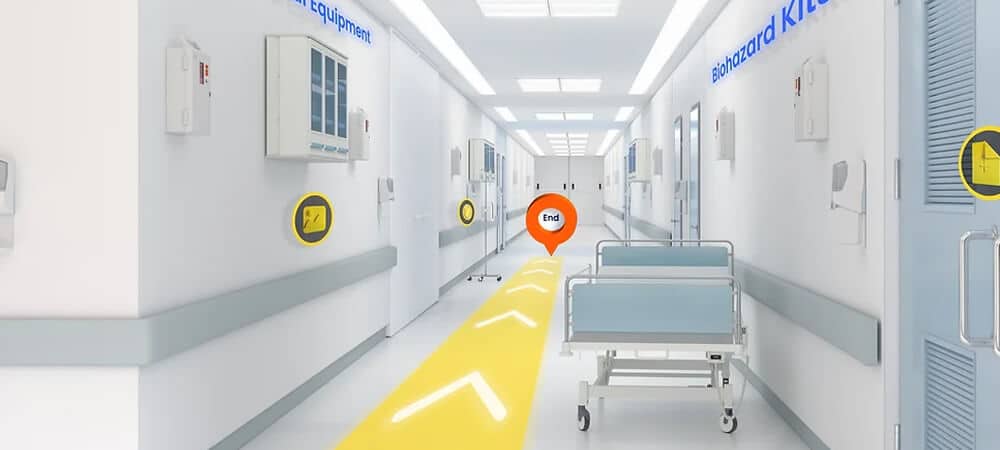
Image attribution: ARway
Rehabilitation
Safety is one of the unique challenges faced during rehabilitation. Patients need to work through various environments and scenarios which might pose a risk while they’re still coming to terms with their present impairments. But that can often prove difficult as the physical world is inherently unpredictable. However, augmented reality healthcare options offer safe environments where patients can practice under the observation of a physiotherapist. These options can also lower physiotherapy costs and open up home care options. And patients themselves will often find physiotherapy more appealing and easier to stick with when it’s done through AR.
Augmented Real-Time Patient Records
Medical records are an indispensable part of a patient’s care. These records tell doctors and nurses about a patient’s current treatment options, contraindications, and other concerns. However, accessing these records can be difficult. But augmented reality healthcare options can bring patient records directly into a medical professional’s line of sight. Cloud-based systems can also ensure that these records are never lost, damaged, or compromised. The systems can even be tied into a patient’s medical wristband. A doctor using that system could quickly scan a wristband and see the patient’s fully updated medical records in front of him.
Marketing Communications
Communication is a recurring theme in augmented reality healthcare. And improved communication even comes up within the context of marketing-related subjects. In any kind of marketing, parties must understand needs, expectations, and how to fully meet both criteria. AR can help entities such as pharmaceutical companies present information about their new products to all relevant parties. And this form of AR is even quite friendly to platforms based on mobile apps. Augmented reality can offer a wealth of information through visualizations that would otherwise be extremely complex. It provides a whole new content platform.
Research & Development
Medical research is a fundamental part of the healthcare system. And augmented reality healthcare tech is solidly part of that cutting-edge research. As with many areas of healthcare, AR is making it easier for researchers to communicate and collaborate. And technology is also revolutionizing how research is performed. For example, augmented reality can give people a look at three-dimensional models of a medication’s behavior in the human body. Lab techs can use AR to track ongoing experiments in locations both near and far. And augmented reality can even be used to study elements of various diseases.
3 Brands Using Augmented Reality in Healthcare
It’s clear that the metaverse is a success story within the business world. The rise of the blockchain and metaverse crypto paved the way for true digital ownership through NFT and similar concepts. But even within the metaverse and AR-related companies, some deserve special attention. The following companies have leveraged AR to aid the cause of augmented reality healthcare significantly. They’re the companies creating the healthcare tools that doctors, nurses, researchers, and more use to save lives.
AccuVein
Supporting the performance of every healthcare professional who works with patients is a lofty goal, but AccuVein’s making it a reality. The company is leveraging its augmented reality healthcare technologies to provide medical workers with a different way to examine patients. AccuVein’s near-infrared (NIR) technology allows people to see superficial vasculature in their patients. This can aid in the identification of optimal peripheral venous access points. AccuVein’s tech can even help healthcare workers avoid veins when working with anesthesia. The result is dramatically improved initial insertion attempts, reduced escalation calls, and improved catheter performance throughout therapy.
Video: AccuVein
Augmedics
The Chicago-based Augmedics is an innovative company behind the xvision Spine System®. It’s the first augmented reality healthcare system that can actually provide surgical guidance. When surgeons use the system, they can essentially “see” into the patient without needing to make an incision. It’s akin to having X-ray vision and peering right into hidden areas to determine what needs surgical attention. The system also allows surgeons to seamlessly work with or manipulate existing implants and instruments during spinal procedures. When taken as a whole, it’s a full linear working environment within the surgeon’s field of vision.
Video: Augmedics xvision
HoloAnatomy
The Case Western University Team has worked with the Cleaveland Clinic and Microsoft HoloLens to create HoloAnatomy. While AR implementations often work with multiple forms of metaverse brands, the HoloAnatomy system is inherently tied to the HoloLens and only works with that particular device. But HoloAnatomy leverages the power of the HoloLens to offer unique options for augmented reality healthcare. One of the most impressive elements of HoloAnatomy is its Library of Digital 3-D Anatomy Art. This asset library offers over 8,000 selections that can be used to create custom educational content that’s perfectly suited to any individual student’s needs.
Video: HoloAnatomy app helps medical students learn anatomy
Augmented Reality Healthcare Is One Part of a Larger Whole
Augmented reality healthcare options highlight how well-matched the two are. However, there are also virtual reality healthcare options that provide complementary benefits. And you’ll find a wealth of other augmented reality implementations within other industries. Just as medical students benefit from AR, so you’ll find high school students doing the same. Archeologists are leveraging cutting-edge modern AR to delve into the past of ancient civilizations. Even artists express themselves with AR using NFT art and new techniques. You can see more examples of innovative AR in the article “Augmented Reality Industries; An Overview of All Sectors Using AR”.
Artificial Intelligence Applications in Hospital Settings
Artificial intelligence is increasingly integrated into hospital operations, affecting diagnostics, treatment planning, and administrative processes. This technological integration aims to enhance the accuracy of medical procedures, personalize patient care, and optimize resource allocation. Implementing AI in healthcare environments significantly shifts how medical services are delivered and managed.
In this article, you’ll learn about how AI is used in hospitals, its potential impacts on healthcare outcomes, and the considerations surrounding its implementation.
Augmented reality healthcare is quite literally saving lives by improving the medical industry. And you now have the tools needed to observe how it’s developing. From here on out, you’re ready for a healthier future filled with improved medical care.
Did You Like This Article About Augmented Reality in Healthcare?
You might also be interested in the following articles:
- Metaverse Workplace; How Metaverse Is Transforming the Workplace
- Metaverse Advertising; Types of Metaverse Marketing & Examples
- Virtual Reality in Construction; Clear Examples of VR in Construction
- Hospitals Using Artificial Intelligence: Revolutionizing Healthcare with Advanced Technology
- AI Doctor: Revolutionizing Healthcare with Artificial Intelligence

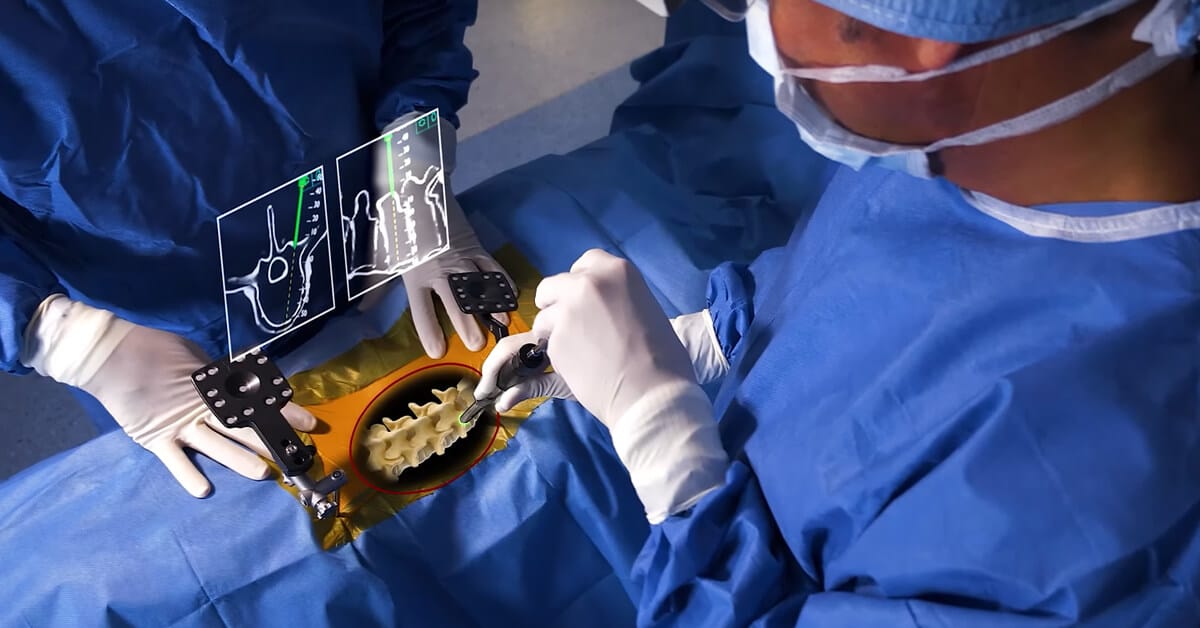
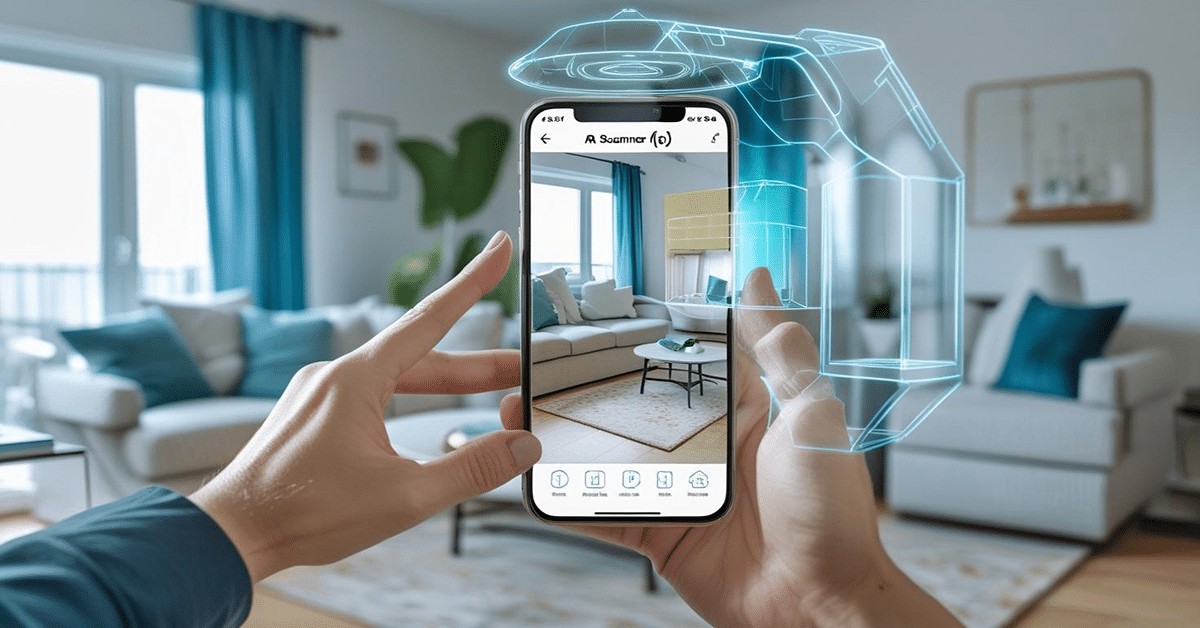
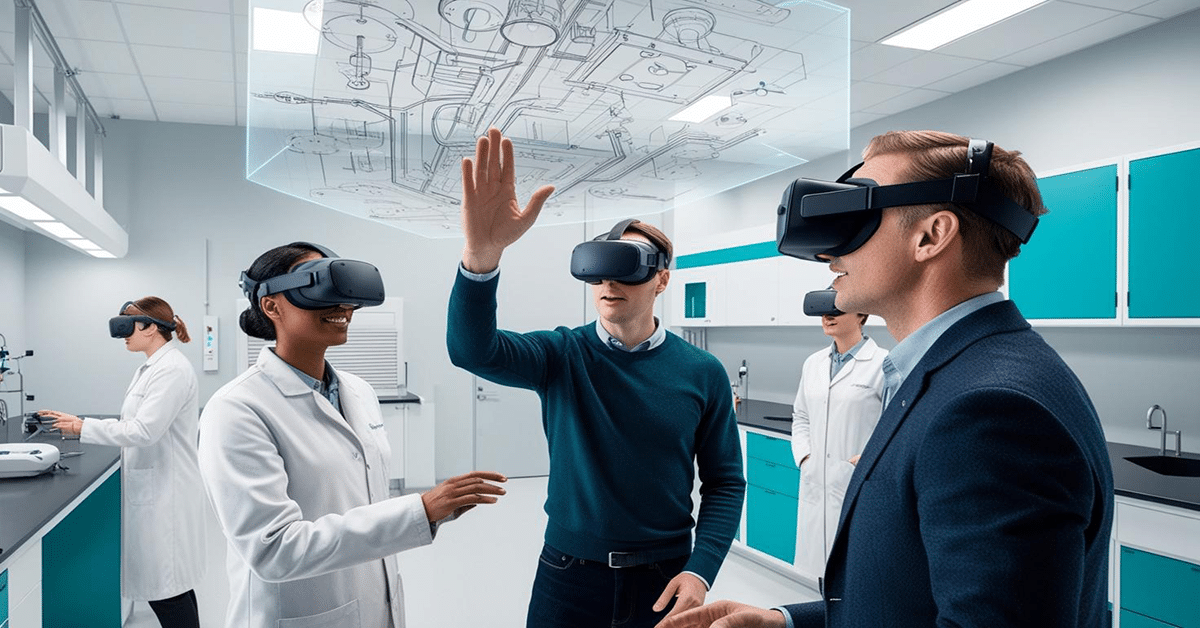
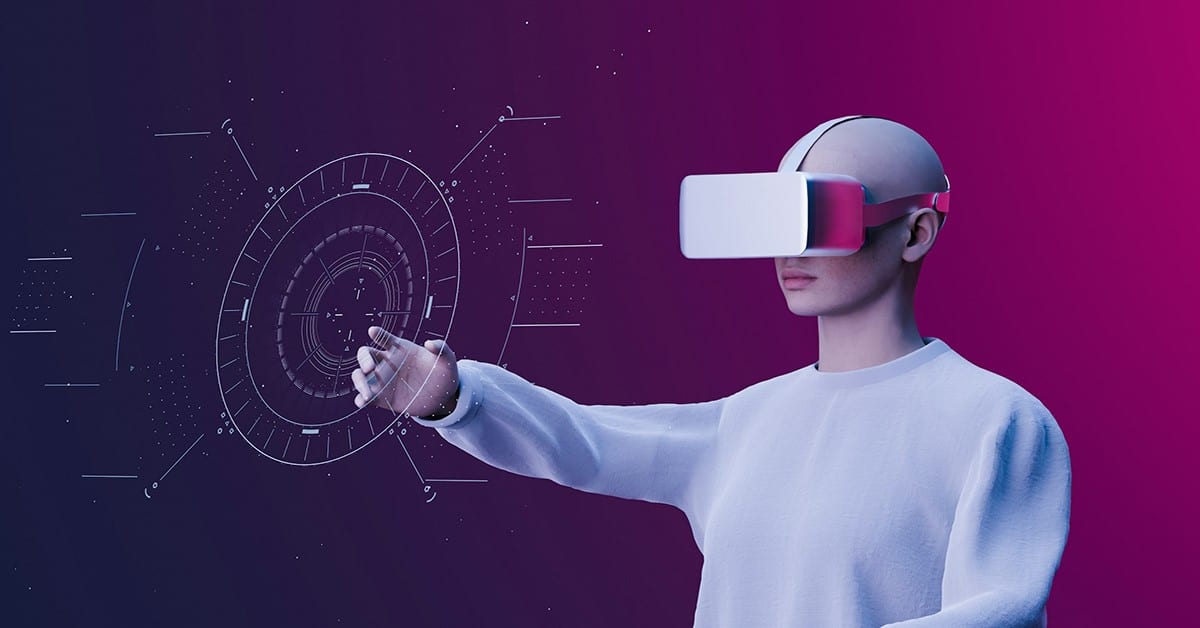
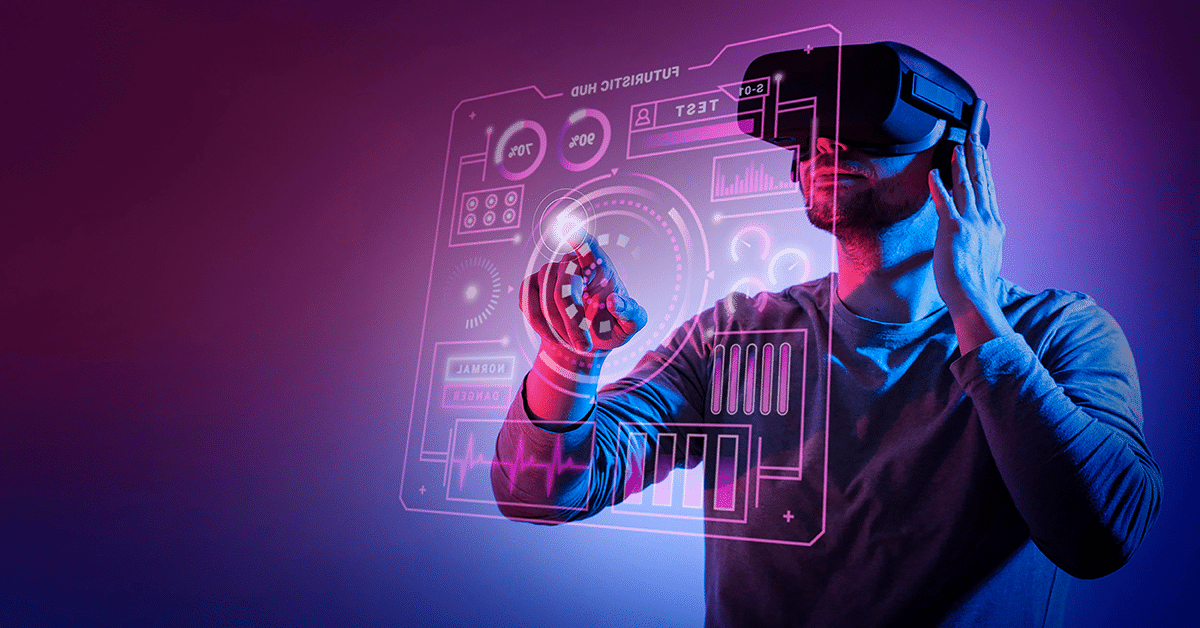
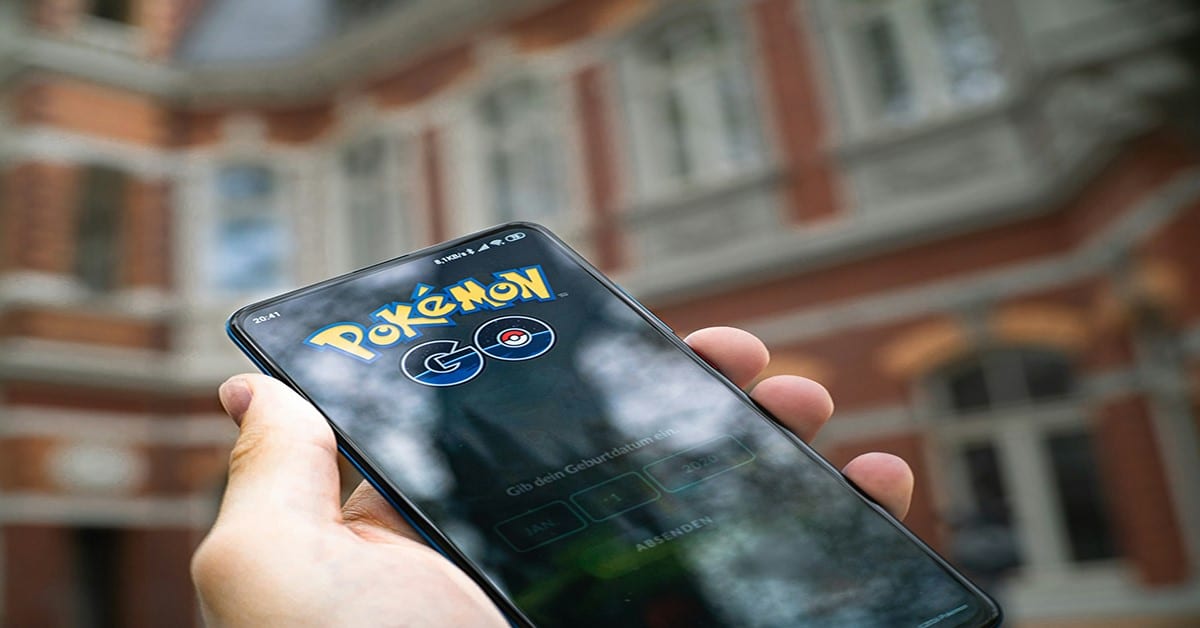


Leave A Comment